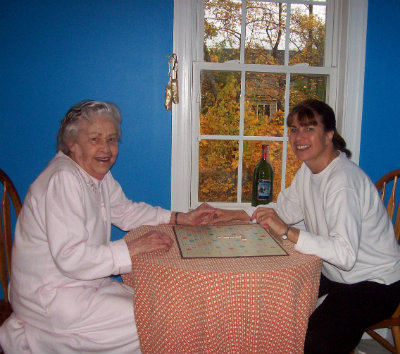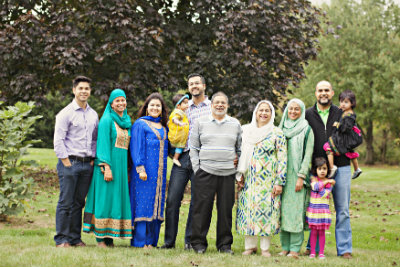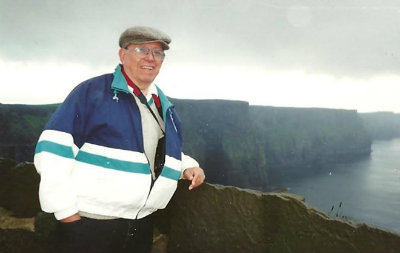 Rosemary Rawlins, whose story "Gratitude for End of Life Lessons" tied for second prize in the contest, sits in "the Bistro" with her mother.
Rosemary Rawlins, whose story "Gratitude for End of Life Lessons" tied for second prize in the contest, sits in "the Bistro" with her mother.“Every time my Mother has a stroke, she wakes up a completely different person. This is okay because, as my Dad once observed, we’ve liked every person she’s been."
“In the past few months, my sister has stopped talking. She’ll want to say something, realize she can’t, throw up her arms and roar.”
“Some details have blurred. Was it after the latest back surgery, the knee replacement, or something else?”
“Life is forever changing. And when we live intimately close to change, it’s not always as noticeable. So it was with my husband Tom’s journey into dementia.“
These are just a few of the opening lines to the moving stories that more than a hundred people shared with us about their family caregiving experiences in the John A. Hartford Foundation’s second annual story contest, “Better Caregiving, Better Lives: Real Life Strategies and Solutions.”
We are very pleased to announce the top three prize winners of our story contest, and to share their inspiring stories and those of the other eight finalists. Each of them answered our challenge: to bring to light the difficulties and obstacles as a family caregiver of an older adult, as well as the strategies, programs, services, and coping mechanisms that people use to more effectively and gracefully care for the older adults in their lives. As you will see when you read them, they also delivered on our request for compelling stories, rich in drama and detail.
We launched the contest during National Family Caregivers Month in November and chose this topic because we see both great need and opportunity for improving care of older adults through better support of their caregivers. More than 65 million people in the U.S. provide care to someone who is ill, disabled, or aged. The vast majority are in the last category, with nearly 15 million people caring for someone with dementia.
Nearly half of these caregivers are performing complex medical and nursing tasks, mostly without training and support. Their health and other needs often go unmet, yet we know that their well-being is directly tied to the quality of life of the older adults in their care. We must do more to connect caregivers to resources and programs that work and design policies and health care systems that incorporate and support them.
Why use stories to accomplish this? Because we know that good stories are powerful. They are how humans share and create wisdom. They motivate us to tackle tough problems and try to change the world. While our heads use data and evidence to think about a problem, it is often a human story speaking to our heart that makes us actually do something. And that’s especially true when you’re trying to connect with key stakeholders on practice and policy change.
Our top prize winners were chosen by an august panel of judges, whom we thank for their assistance: Kathy Kelly, Executive Director of the Family Caregiver Alliance; Yannick Rice-Lamb, a multi-media journalist and educator, and co-founder of FierceForBlackWomen.com; and Lisa Gwyther, who directs the Duke Family Support Program in the Duke University Center for Aging and who serves on our Change AGEnts Dementia Caregiving Network. They helped us select the following winning stories:
 Dr. Amjad and his family in 2014.
Dr. Amjad and his family in 2014.Our first prize winner comes from Halima Amjad, MD, MPH, a geriatric medicine fellow at Johns Hopkins University. In her top-rated piece, “Caring for Dementia: Returning to the Village,” she shares the story of her father, a retired dentist, who was diagnosed with frontotemporal dementia when he was 60 and has reverted to a more child-like state. Dr. Amjad uses the adage that “it takes a village” and shows, through the efforts of her mother and entire family, how a community of people can help effectively engage in dementia caregiving. This village includes other caregivers her family meets in person and online through the Association for Frontotemporal Degeneration, who offer concrete and feasible ways of dealing with such issues as wandering and incontinence.
There was a tie for second prize between Rosemary Rawlins, a caregiver, author, speaker, and editor for BrainLine Blogs, and Marielena Zuniga, a creative writer and journalist.
In “Gratitude for End of Life Lessons,” Rawlins shares the story of how her mother learned from the experience of her father’s difficult decline and death from dementia and chose a better way to live out the end of her own life. She includes important lessons about the appropriate early use of hospice and strategies for maintaining connections to relatives and loved ones.
 Antonio Z. Zuniga at the Cliffs of Moher, Ireland, one of the many countries where he once spoke.
Antonio Z. Zuniga at the Cliffs of Moher, Ireland, one of the many countries where he once spoke.“Sitting with Raymond: The Zen of Caregiving,” the other second prize winner, recounts Zuniga’s charismatic father’s altered state after a stroke. Zuniga offers a candid portrayal of the emotional toll that caregiving takes on her. She turns to an 8-week course on mindfulness-based stress reduction, along with her faith and spirituality, to help her cope.
Our judges did a superb job choosing the prize winners, and it was certainly not an easy task. The top three stories were chosen from a field of 11 finalists, all of which were strong. I encourage you to read the other finalists as well. Links to the stories are listed below.
While we challenged people to be brave in sharing their stories, we now challenge all of you to creatively utilize them to make change. Take these stories to your health professional colleagues, health systems leaders, and policymakers to help them understand the challenge of elder care and the opportunities for improvement. Embed the stories in your teaching and presentations, in your advocacy, or as a guide to developing interventions. We welcome all of these uses as long as the author and the Hartford Foundation are recognized.
We will be highlighting the top three winners and other stories that caught our attention in follow-up posts, and we will continue to discuss the lessons and strategies that were offered and how to best use these stories.
But for now, we offer our congratulations and sincere appreciation to the top winners, as well as to the finalists and to all the authors who so generously shared their personal and often intimate stories. We received many messages of thanks from entrants for providing a venue to share their experiences, but it is all of us who will learn from and use these stories to deliver on the promise of “Better Caregiving, Better Lives” that should be grateful.
Congratulations to all our story contest finalists:
“How I Became a Caregiver”
by Kathryn Adams
“Untitled”
by Judy Donoghue
“The Right Room”
by Amber Herrick
“My Parents, Myself, and My Children”
by Carolyn Iverson
“Two Peas in a Pod”
by Karalee Jacobs
“Untitlied”
by Lisa Johnson
“More Than A Bath”
by Elizabeth Mulvaney
“Wishing”
by Rosemarie Robotham
